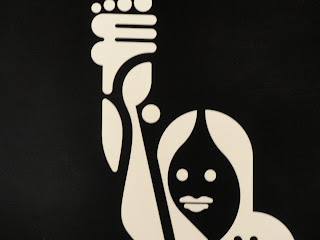 Last summer I went to a midtown art gallery to see an exhibit by Ryan McGuinness entitled "Women: Sketches & Solutions."
Last summer I went to a midtown art gallery to see an exhibit by Ryan McGuinness entitled "Women: Sketches & Solutions."  The first thing that struck me about McGuinness' work in this exhibit was the contrast between the often sexual poses of the models and the finished product of the art, which at once seemed to be both enhanced and stripped down. The description of the exhibit, a portion of which I photographed here, says the artist took the "tradition of the male gaze and neutralized the resulting sexualized female forms" to create "a purely aesthetic exercise in image-making."
The first thing that struck me about McGuinness' work in this exhibit was the contrast between the often sexual poses of the models and the finished product of the art, which at once seemed to be both enhanced and stripped down. The description of the exhibit, a portion of which I photographed here, says the artist took the "tradition of the male gaze and neutralized the resulting sexualized female forms" to create "a purely aesthetic exercise in image-making." If McGuinness' goal was to create a "purely aesthetic exercise," I don't necessarily think he succeeded throughout all the artwork included in the exhibit. The images are still recognizable as women, their bodies still bare and open to the imagination. Sometimes the poses are subtle and seductive, sometimes shocking and abrasive. You might find yourself thinking less of them as an aesthetic exercise and more an exercise in the kind of art meant to shock and do little, if anything, else.
If McGuinness' goal was to create a "purely aesthetic exercise," I don't necessarily think he succeeded throughout all the artwork included in the exhibit. The images are still recognizable as women, their bodies still bare and open to the imagination. Sometimes the poses are subtle and seductive, sometimes shocking and abrasive. You might find yourself thinking less of them as an aesthetic exercise and more an exercise in the kind of art meant to shock and do little, if anything, else.
Still, other poses reach the ideal McGuinness was going for. Some are truly graceful and gorgeous, and you find yourself following every line of ink on the page.
 The most interesting pieces in the collection, though, were the ones that showed the transition from the model drawings to the bare ink. Through these transitions you can see the shadows fade into black and white, see detail disappear altogether. This one, for example, was one of my favorites: The model's leg and toes turn into almost a musical instrument, and the waves of her hair seem to resemble musical notes.
The most interesting pieces in the collection, though, were the ones that showed the transition from the model drawings to the bare ink. Through these transitions you can see the shadows fade into black and white, see detail disappear altogether. This one, for example, was one of my favorites: The model's leg and toes turn into almost a musical instrument, and the waves of her hair seem to resemble musical notes.
It seems no matter what you do to the female form, one constant remains: It is impossible to stop looking.






The artist, Ryan McGuinness. Below, a sculpture I got to take a look at: Not part of the exhibit, but striking nonetheless.



























